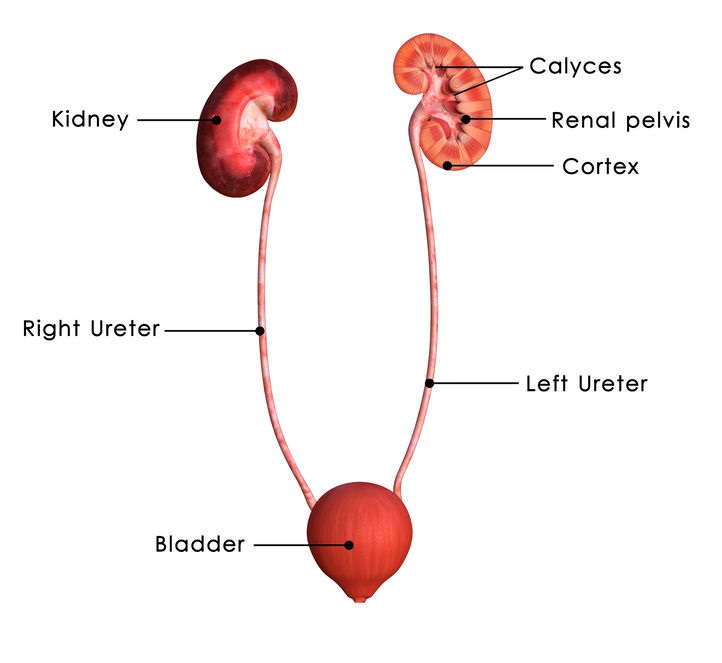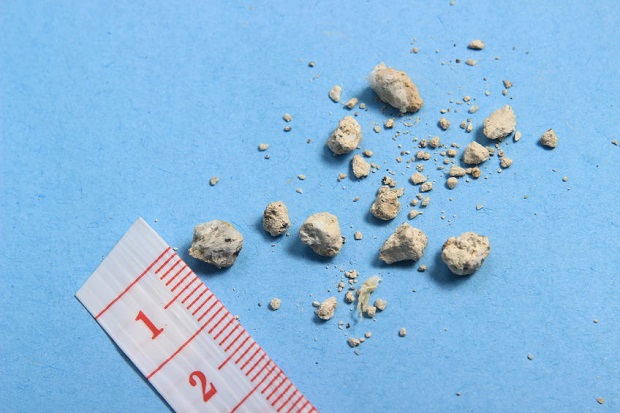
How Long Do Kidney Stones Take to Pass?
- The average kidney stone will take 1-3 days to pass but may take up to four weeks.
- A kidney stone that is smaller than 4mm usually passes within a week or two.
- A stone larger than 4mm can take two to three weeks to pass completely.
- The time for a kidney stone to pass on its own and when medical intervention is required depends on several factors, including size, location, and type of kidney stone.
Jump Ahead
- Average Length of Time for a Kidney Stone to Pass
- Size Affects How Long It Takes a Kidney Stone to Pass
- Location Affects How Long It Takes a Kidney Stone to Pass
- Type of Kidney Stone May Affect Length of Time to Pass
- Resources
Average Length of Time for a Kidney Stone to Pass

A kidney stone that is smaller than 4mm usually passes within a week or two. A stone larger than 4mm can take two to three weeks to pass completely. It is important to have your physician perform a few simple tests to determine exactly what size and type of kidney stone you are dealing with to help make the process as comfortable as possible. The tests will also help to determine any risk factors. [1]
Size Affects How Long It Takes a Kidney Stone to Pass
In the case of kidney stones, size does matter. A larger stone will take longer to pass than a smaller stone. Smaller stones are easier to pass than larger stones. Kidney stones that are smaller than 5mm in size will pass on their own in 90% of cases. Stones that are 5-10mm pass on their own in 50% of cases, but many require surgical treatment. Stones larger than 10mm rarely pass on their own without intervention. [2]
The good news is that 85% of kidney stones are small enough (5mm) to pass on their own through urination, usually in two to three days. [3]
Location Affects How Long It Takes a Kidney Stone to Pass
The stone’s location within the ureter can also factor into how long a kidney stone takes to pass. The ureter is the tube that carries urine from the kidney to the bladder. In one observational study, stones that were located in the vesico-ureteric junction, where the ureter meets the bladder, passed at a rate of 79%, while stones in the proximal ureter, the portion of the ureter in the renal pelvis of the kidneys, passed at a rate of 43% regardless of stone size. [4]
Other factors that affect how long it takes for a kidney stone to pass are the person’s size, prior stone passage, prostate enlargement, and pregnancy. [5]

Type of Kidney Stone May Affect Length of Time to Pass
To a lesser degree, the type of kidney stone may factor into the ease or difficulty of naturally passing a kidney stone. There are four main types of kidney stones: calcium, uric acid, struvite, and cystine stones.
- Calcium stones are the most common, mainly made up of calcium and oxalate. Dietary factors and high doses of vitamin D can cause calcium stones.
- Uric acid stones form when your urine is too acidic. This can occur from not drinking enough fluids, a high protein diet, or in those who suffer from gout.
- Struvite stones form following a urinary tract infection where ammonia and bacteria build up in urine. These stones can grow increasingly fast and can grow quite large.
- Cystine stones are caused by a genetic disorder where cystine leaks into the urine from the kidneys.
Mayo Clinic – “Kidney Stones“
Again, it circles back to its size. Because struvite stones can grow quite large very quickly, they are more likely to require aggressive intervention. [6]
Resources
- [1] Cleveland Clinic – “Kidney Stones: Symptoms, Causes, & Treatment.”
- [2] National Center for Biotechnology Information – “Kidney Stones Overview.”
- [3] Milton S. Hershey Medical Center. Penn State University – “Kidney Stones.”
- [4] Meher, Shireen; Obstetric Medicine; “Renal Stones in Pregnancy” 2014. Vol. 7, No. 3, pp: 103-110
- [5] Medicine.net – “Kidney Stones – Nephrolithiasis.”
- [6] Diri, Akif “Management of Staghorn Renal Stones.” Renal Failure. 2018. Vol. 40, No. 1, pp: 357-362
DISCLAIMER: THIS WEBSITE DOES NOT PROVIDE MEDICAL ADVICE
The information, including but not limited to text, graphics, images, and other material on this website, is for informational purposes only. No material on this site is intended to be a substitute for professional medical advice, diagnosis, or treatment. Always seek the advice of your physician or other qualified healthcare providers with any questions you may have regarding a medical condition or treatment before undertaking a new healthcare regimen, and never disregard professional medical advice or delay in seeking it because of something you have read on this or any other website.
